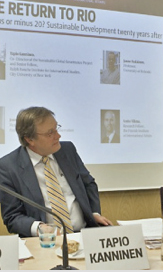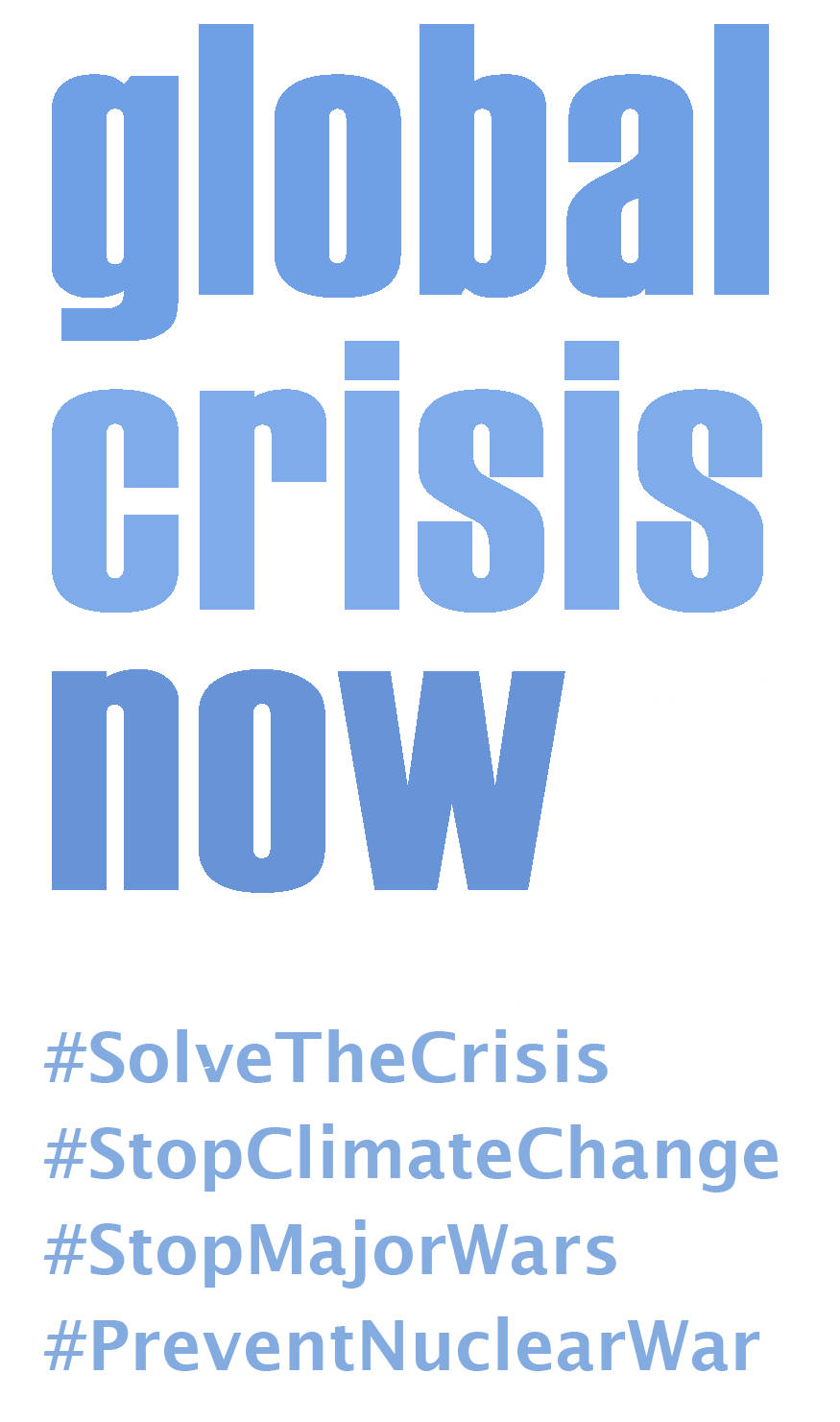
Dr. Tapio Kanninen
Dr. Tapio Kanninen, President, Global Crisis Information Network, Inc.
December 10, 2014 – I have been giving talks on climate change and global sustainability over the years to many audiences. On September 17, 2014 I spoke at the United Nations Association for the USA (UNA-USA Southern New York State Division), at an event, “Climate and Energy Policy in the Global Context.” Some 30 people attended. Former EPA official Dr. George Garland also spoke. The President of the Association, Jeanne Betsock Stillman, opened the meeting and my former UN colleague Dr. David Stillman was the moderator. Below this blog is a video of the talk, and the Powerpoint presentation.
During this talk, I was particularly struck by the enthusiasm and the intelligence of the audience, mostly young professionals, who were attending the talk. They came from the best universities and were in the first years of challenging careers. Most were Americans but a few came from Europe and some came from elsewhere, and from the developing world, as well. They were all very engaged in what I and George were saying about the problems climate change is causing. They were all very animated in their questions after our talk. All seemed to care very deeply about the problem of climate change, and the future of the planet we live on. And they all wanted to do something about it and spoke of making changes to the world. Many offered ideas on how to do this. Their ideas were innovative, imaginative, and gave me hope this new generation might be up to the challenges presented by climate change.
After some 30 years working at the United Nations, and seeing its limitations while working there, it was refreshing on that night to see there are many Americans and other nationalities who still truly believe in the ideals of the United Nations. In my book “Crisis of Global Sustainability”, I tried to make a case that the establishment of the League of Nations and the UN marked turning points in the evolution of human consciousness. I said it was a move from purely national or tribal interests to the common good. I also said our evolution is far from complete.
After speaking to those young people that night, and hearing what they had to say, I now believe humanity is evolving, once again, for the better. Although this group was just a small sample of our younger generation, it still augurs well for the future. It showed me that at least part of this new generation are thinking differently than their parents and grandparents did. They are thinking of the Earth and humanity as one. And they are thinking in the holistic way required of the daunting and seemingly impossible climate change problems now facing us. They are, for me, perhaps the most important solution to the climate change crisis. Because it is their hope and determination, their honesty and intelligence, and energy that may be able to save us in the future from the problems we have created in the past and continue to create in the present.
In my view the climate change crisis will eventually lead to a rebirth of the United Nations, because it is only through the UN, through a global organization belonging to all of humanity that the problem can be solved. The rebirth of the UN may take a long time, however. Because for this to occur, we may need a complete overhaul of the United Nations and its Charter, and the creation of a new kind of organization that is better able to meet the challenges of the today and tomorrow. However, if the voices I heard that night are indeed the voices of tomorrow, then it might be possible for us to remake the UN. For those people and those of their generation like them may lead the way in the future to an enlightened internationalism, one brimming with enthusiasm and imagination, that takes us from the state we are in now to a higher plane of global and international consciousness that could save us from the problems we have created for ourselves. Until I heard those young people speak that night, I felt such ideas might be fanciful and not based in the reality of the world we currently live in. But now I am a little bit more optimistic that many among the young are very aware of the climate change problems we face. And I believe they are ready to face these problems, and help solve them. But to do this, they must be sure their voices are heard.
The younger generation must now speak out, on social media, about climate change. Their message should be addressed to the older generation, the ones now in charge of governments and business. Their message should be something like this: “The world you are about to hand over to us, to live in, may be unlivable by the time we are in charge of it, due to climate change. Those who preceded you gave you a livable world. We insist you do the same with us. You must act to stop climate change, now.”
As they speak out, we should add our voices to theirs. Together, we can form a critical mass of global public opinion that government and business leaders will listen to. They will work with urgency and seriousness of purpose to solve the climate change crisis.
And the young will have led the way.
Dr. Tapio Kanninen, President of the Global Crisis Information Network and Senior Adviser of UNCPGA. He is also Director of the Major Wars Project at the Ralph Bunche Institute for International Studies at the CUNY Graduate Center where he earned his PhD in Political Science in 1990. He was Chief of Policy Planning at the UN Department of Political Affairs (1998-2005) and Head of the Secretariat of Kofi Annan’s five Summits with Regional Organizations. He has worked on several UN reforms: as Secretary and Research Focal Point of the High-level Drafting Group of Boutros-Boutros Ghali’s An Agenda for Peace and Convener of the Interdepartmental Task Force to Implement its Recommendations; Secretary of General Assembly Working Groups on An Agenda for Peace; of Strengthening of the UN System; and of the Security Council reform. He has also earlier worked on global sustainability and is a co-founder of Climate Leadership Coalition, Europe’s largest non-profit business network on climate change. He is a member of Club of Rome, and the history of the Club is described in his book “Crisis of Global Sustainability” (Routledge, 2013). This website, “Global Crisis Now”, is one of the follow-up projects to the book. More information about the book can be found on the Crisis of Global Sustainability website.
A NEGOTIATED SOLUTION TO THE WAR IN UKRAINE SHOULD BE SOUGHT MORE DILIGENTLY
THE FACT THAT THERE IS NO CLEAR WINNER IN WAR OFTEN OFFERS BETTER OPPORTUNITIES FOR PEACE AND DIPLOMACY THAN COMPLETE DEFEAT.
Published in Helsingin Sanomat in Finnish as op-ed on 6 July 2022.
The mindset of a TOTAL defeat comes from the legacy of the Second World War. Germany and Japan were completely crushed, and peaceful states grew out of the ruins. But if Adolf Hitler had nuclear weapons at his disposal, wouldn’t he have used them in desperation at the end of the war? Are we putting Russian President Vladimir Putin in the same situation?
In the United States, critical perspectives on their own country’s war policy have begun to appear. Director of National Intelligence Avril Haines has warned that the threat of using nuclear weapons will increase as the war drags on. Among others, economist Jeffrey Sachs and The New York Times have criticized Joe Biden and Ukraine for their reluctance to negotiate with Russia.
A similar process would be needed now. Ukrainian President Volodymyr Zelenskyi also called for a complete reform of the international security system and the United Nations when he spoke to the UN Security Council in April. Article 109 of the UN Charter also enables this process. As part of this process, the relations between NATO and Russia must be revitalized.
Just before Russia’s attack on Ukraine, former British Foreign Minister David Owen and four other foreign policy experts considered Kissinger’s previous proposal of finlandization of Ukraine unrealistic, but said that NATO could together with Ukraine propose confidence-building measures to Russia. This proposal can be returned to when serious ceasefire and peace negotiations are taking place.
The danger of an accidental nuclear war has greatly increased as a result of the war in Ukraine and will increase even more as the war drags on. A panel consisting of experts on nuclear weapons should be urgently established to assess the increased risks of nuclear war and ways to contain them. The panel could also consider further steps to revive the frozen nuclear arms control negotiations.
A similar panel is also needed to prevent an irreversible climate crisis. As a result of the war in Ukraine, several countries invest in strengthening their armed forces instead of climate action. The consumption of fossil fuels is only increasing. Finland has been active in solving the climate crisis and could also take such an initiative now.
THE DANGER OF AN ACCIDENTAL NUCLEAR WAR HAS INCREASED.
A similar process would be needed now. Ukrainian President Volodymyr Zelenskyi also called for a complete reform of the international security system and the United Nations when he spoke to the UN Security Council in April. Article 109 of the UN Charter also enables this process. As part of this process, the relations between NATO and Russia must be revitalized.
Just before Russia’s attack on Ukraine, former British Foreign Minister David Owen and four other foreign policy experts considered Kissinger’s previous Proposal of Finlandization of Ukraine unrealistic, but said that NATO could together with Ukraine propose confidence-building measures to Russia. This proposal can be returned to when serious ceasefire and peace negotiations are reached.
The danger of an accidental nuclear war has greatly increased as a result of the war in Ukraine and will increase even more as the war drags on. A panel consisting of experts on nuclear weapons should be urgently established to assess the increased risks of nuclear war and ways to contain them. The panel could also consider further steps to revive the frozen nuclear arms control negotiations.
A similar panel is also needed to prevent an irreversible climate crisis. As a result of the war in Ukraine, several countries invest in strengthening their armed forces instead of climate action. The consumption of fossil fuels is only increasing. Finland has been active in solving the climate crisis and could also take such an initiative now.
Tapio Kanninen
The author is the president of the New York-based Global Crisis Information Network and a former head of policy at the UN Department of Political Affairs

